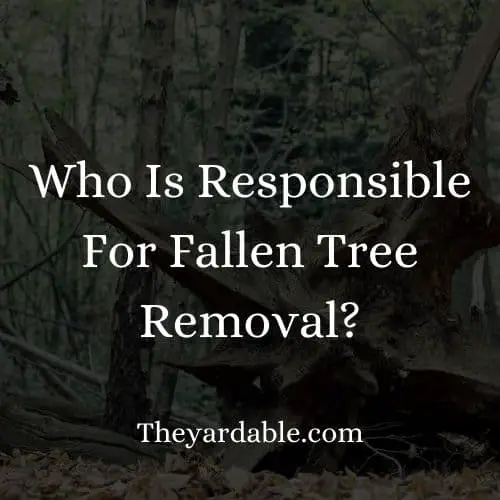A tree falling near or on your property can be a very stressful situation. Not only can they cause a lot of damage to your property, but they can seriously harm somebody. Sometimes a fallen tree might also block your driveway or the road in front of your house. So, who should be responsible for the removal of a fallen tree? Let’s take a look.
If the fallen tree is located on your own property, then you will have to remove and bear the expenses of any damage related to the accident. If part of the tree has fallen onto neighbouring property, then they will be responsible for its removal. If a tree is located on public grounds, then local authorities will be responsible for removing it, but you might have to pay for damages incurred to your property.

What If A Tree Within Your Own Property Falls on Your Property?
If a tree that is located on your own property falls within your property, you will be responsible for the cost of removing it. If you have home insurance, then the cost of tree removal might be covered by the insurance company.
This however can depend on the reason behind the tree falling down. If the tree was knocked over due to natural reasons like a storm, strong winds or excessive rains, then the insurance company should cover the removal costs. But if the tree fell down due to your negligence then you might have to cover the costs.
Negligence can be due to the tree being dead or diseased for quite some time and you didn’t do anything about it or if the tree had visible signs of damage prior to it falling down. Also, if the tree species are known to be dangerous and if you didn’t take proper care, the insurance company might refute the claims.
Recommended reading: Should Dead Trees Be Cut Down?
What If A Tree on Your Own Property Falls on Neighbouring Property?
It should be noted that if some parts of the tree located on your own property should fall on neighbouring property, the latter would be responsible for bearing the costs of removal pertaining to their property.
This might change if the tree had visible signs of damage or diseases and the tree fell down due to your negligence. But according to law, you will not be responsible for covering the costs of removal if the tree fell down due to natural reasons.
Of course, you can talk to the neighbour to share some of the costs. This would also apply in the opposite situations.
What If A Tree Located in A Public Place Falls on Your Property?
If a tree is located in a public space and it falls on your property, the cost of property damage will have to be incurred by you or your insurance company. But the cost and responsibility of tree removal should be incurred by the local committee.
Who Is Responsible If A Tree Falls on Your Car?
No matter if the tree is located in a public space or on your own property, the costs of damage to the car will be incurred by you but the cost of tree removal will be incurred by the local authorities if the tree is located in a public space.
Who Is Responsible for Tree Removal If Tree Falls on The Road or on The Driveaway In Front of Your House?
If the tree which has fallen on the road or on your driveaway is located on your property, you will be responsible for removing it. But if the tree is located on the public ground then the local authorities will be responsible for removing it.
One thing to note here is that if the tree is located on your property and it is blocking public utilities like roads, you will be asked by local authorities to remove the tree in a fast manner. In some cases, the local authorities might remove the tree to speed up the process, but you might have to cover the costs.
Conclusion
If a tree located on your property falls down within your own property, then you will be responsible for removing it. But if part of the tree falls on neighbouring property, then you will not be responsible for its removal. If a tree in a public place falls on your property, the authorities will have to remove it but you will have to pay for any damages incurred to your property.

Hi!
I am the guy behind Theyardable.com. I grew up on a homestead and I am here to share the knowledge I have and things I learn while living in the countryside.
